Fujitsu Tech Open House 2024
October 23, 2024
Japanese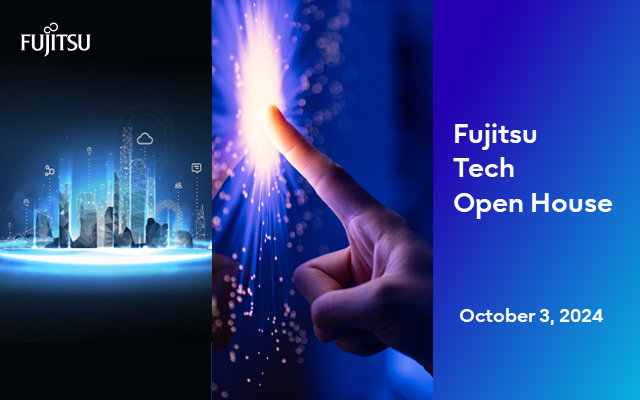
Our Fujitsu Tech Open House 2024 showcased a bold vision for the future of AI, quantum computing and open innovation, bringing together industry leaders, startups, and experts to explore groundbreaking technologies and collaborative partnerships. Through keynote speeches, presentations, and live demos, we showcased how Fujitsu is evolving our technology strategy and embracing an open innovation model to tackle both business and societal challenges.
Fujitsu Technology Strategy
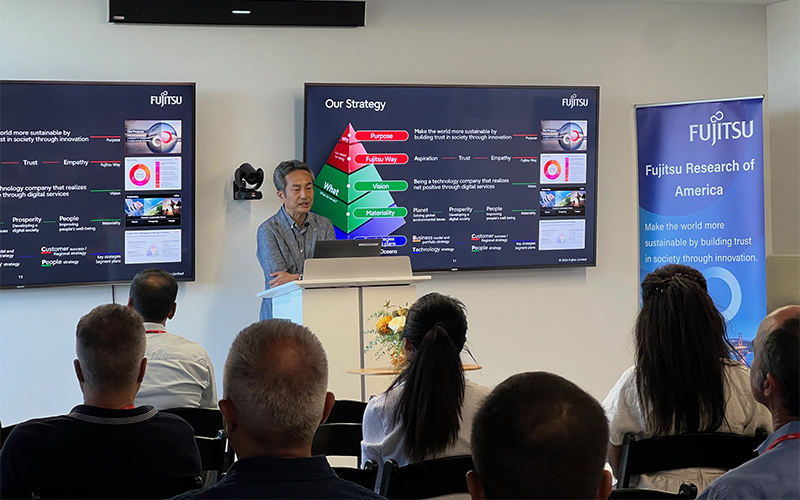
Held on October 3rd, 2024, we began with a keynote from Ted Okada, head of our Technology Strategy Unit, where he outlined Fujitsu's vision for the role of AI in shaping the future. According to Ted, our goal is to lead the AI landscape by integrating advanced technologies across multiple industries. The focus is not solely on task-specific AI solutions; rather, we aim for a broader transformation that promotes sustainability, prosperity, and societal well-being. This is not just about innovating for business purposes—it’s about addressing global challenges through AI.
Our core message for the event was our ongoing commitment to democratizing AI. We see AI as a tool to enhance human capabilities, streamline workflows, and enable faster, smarter decision-making processes. We’ve developed enterprise-specific models that help large organizations manage data volume, ensure regulatory compliance, and derive insights that drive growth. As Ted pointed out, our AI-driven consulting and modernization services are key to this, allowing us to meet industry needs through platforms like Fujitsu Kozuchi.
Perhaps most importantly, we’re moving away from the traditional model of in-house R&D. Instead, we’re actively building an ecosystem of external collaborators, including startups, universities, and government agencies. This open innovation model allows us to co-create solutions and accelerate the process of bringing new technologies to market. Whether it's through joint ventures, strategic investments, or cross-industry partnerships, we’re working to build a global ecosystem that fosters rapid innovation and shared success.
Fujitsu R&D Strategy and Initiatives
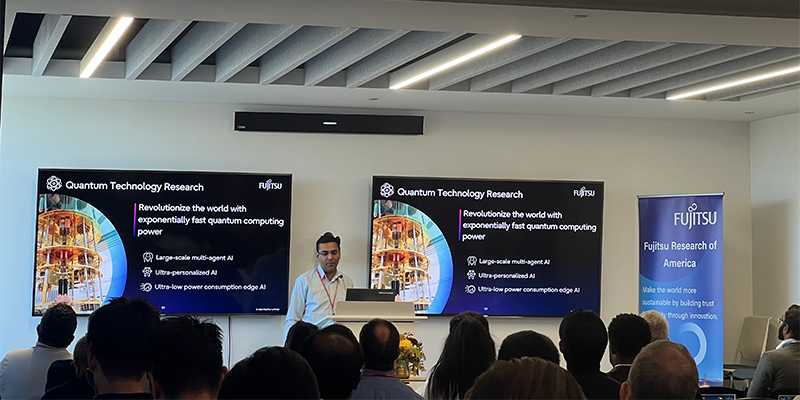
Next, Indradeep Ghosh, CEO of Fujitsu Research of America, detailed the advancements in our global R&D strategy, with a particular emphasis on how our innovations are contributing to both business transformation and societal impact. Our research network spans 20 global locations, with over 1,000 researchers and an annual budget of more than $1 billion, positioning us at the forefront of technological breakthroughs in AI, quantum computing, security, and converging technologies.
Our AI research is focused on solving business challenges through enterprise-specific AI models. Key technologies such as Knowledge Graph Extended Retrieval-Augmented Generation (RAG), Generative AI Amalgamation, and Generative AI Audit Technology are enabling businesses to harness large-scale data more effectively. These innovations allow for automated model generation, customized solutions, and audit capabilities to ensure compliance and accuracy in AI outputs, making our AI technologies highly applicable across various industries.
Indradeep highlighted the development of our AI Computing Broker, a groundbreaking technology designed to optimize GPU utilization and significantly reduce energy consumption in data centers, which are expected to account for 10% of global electricity use by 2030. This innovation is critical in both reducing operational costs and promoting environmental sustainability.
In the realm of data security, Fujitsu is addressing the challenges of disinformation and AI-generated misinformation through zero-trust frameworks and digital trust technologies. These efforts are crucial for industries like finance, healthcare, and government, where data integrity is paramount. Our solutions in this space aim to verify the authenticity of information and safeguard against the growing threats posed by disinformation.
Fujitsu’s work on converging technologies is leading the development of social digital twins, which combine digital simulations with human behavioral models. These digital twins allow for predictive modeling in smart cities, retail environments, and infrastructure planning, helping to solve complex societal challenges. By integrating insights from the social sciences with cutting-edge AI, we are providing a holistic approach to improving decision-making and driving sustainable outcomes.
These research initiatives underscore our commitment to open innovation, fostering collaboration across industries, academia, and research institutions to drive meaningful technological advancements.
Fujitsu Startup Engagement Models
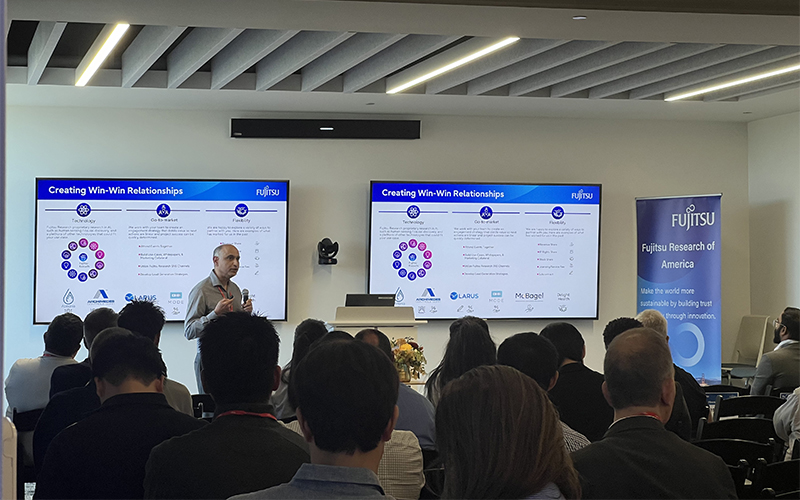
Following that was Surya Josyula’s presentation on our Startup Engagement Models. As the head of the Business Incubation Division at Fujitsu Research of America, Surya discussed how we’re creating win-win partnerships with startups through strategic investments, licensing agreements, and co-creation. Our model offers multiple pathways for startups to engage with us, depending on their needs and the synergy between their technologies and ours.
Surya provided several examples of successful partnerships. One notable case was our collaboration with Atmonia, a company focused on sustainable ammonia synthesis. By integrating Fujitsu’s high-performance computing and AI technologies, we helped optimize their catalyst development, which contributes to carbon-neutral goals. Another impactful partnership is in healthcare, where we worked with startups to develop EEG signal analysis tools for detecting delirium, showcasing how our technology transfer models allow us to drive innovation while supporting startup growth.
Through our Fujitsu Ventures program, we’re strategically investing in sectors like AI, quantum computing, clean tech, and 5G, helping startups that align with our vision for sustainability and innovation. Our flexible engagement framework includes revenue sharing, licensing, IP rights, and equity stakes, ensuring that our partnerships are scalable and mutually beneficial.
Startup Presentations: MoBagel and Archimedes Controls
MoBagel Data Ease: A Generative Approach to Real-Time Intelligence
Data Ease: A Generative Approach to Real-Time Intelligence
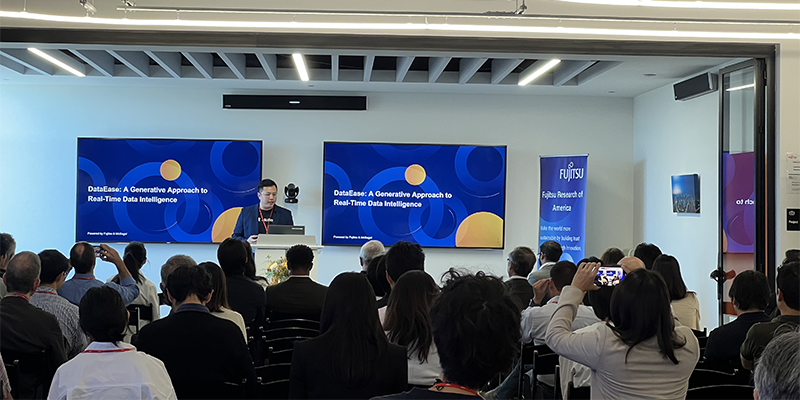
One of the startup presentations came from MoBagel, whose platform, DataEase, is revolutionizing the world of data intelligence. MoBagel's approach enables businesses to use AI-driven hyperautomation to address key operational challenges. With Fujitsu as a strategic partner, MoBagel has implemented no-code AI solutions for various industries, ranging from finance to supply chain management. DataEase allows business teams to deploy AI/ML workflows without needing a deep understanding of data science. This enables companies to reduce deployment timelines, lower operational costs, and increase demand forecasting accuracy.
Archimedes Controls : Auto-ML Powered IoT Solutions for Data Centers and Industrial Control
: Auto-ML Powered IoT Solutions for Data Centers and Industrial Control
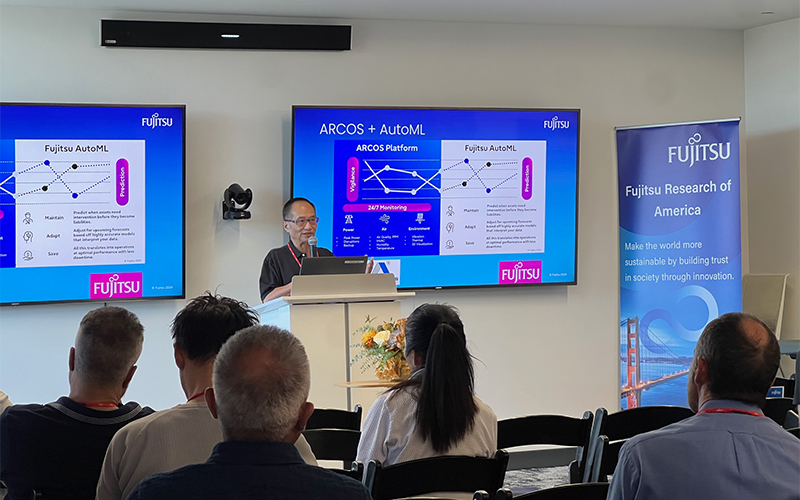
The second startup presentation, from Archimedes Controls, showcased the integration of Fujitsu AutoML with their ARCOS® Industrial IoT platform. This collaboration is driving the automation of industrial controls, with applications in data centers, environmental monitoring, and agriculture. By using real-time sensors to monitor critical conditions such as temperature, humidity, and power consumption, Archimedes’ solutions enable businesses to make data-driven decisions for predictive maintenance. Their demo clearly illustrated how IoT and AI can work together to improve operational efficiency and reduce costs.
Fireside Chat: Open Innovation with Professor Henry Chesbrough (Mike and Carol Meyer Fellow, Faculty Director, Garwood Center for Corporate Innovation, Haas School of Business, UC Berkeley)
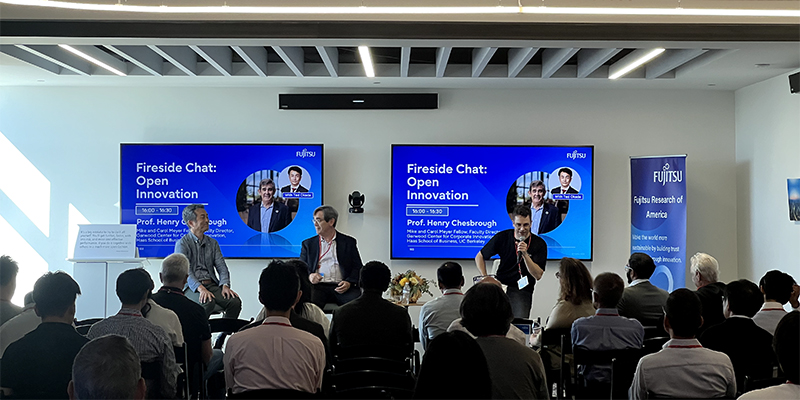
One of the most insightful parts of the day was the Fireside Chat with Professor Henry Chesbrough, Ted Okada, and Zachary Rainey, moderator of the event and Open Innovation Manager at Fujitsu Research of America. Professor Chesbrough, who coined the term “Open Innovation,” spoke about the growing importance of distributed knowledge flows. He drew parallels between Fujitsu’s history of spinning off companies like FANUC and the modern trend of cross-industry collaboration.
They discussed how large companies, like Fujitsu, are increasingly turning to startups for innovation, moving away from the old model of centralized R&D. Professor Chesbrough pointed out that while large companies still invest heavily in research, startups now account for nearly 20% of R&D spending. The ability to move quickly, experiment, and adapt is often a strength that startups bring to the table, and by fostering open innovation, we’re tapping into that agility.
They also talked about the pitfalls of open innovation, particularly the challenge of speed in decision-making. While startups can pivot rapidly, large companies often take longer to respond. To address this, Professor Chesbrough suggested setting financial thresholds to allow faster decisions without needing high-level approval, a model we are already adopting in our partnerships.
Technology Showcase: Discovering the Future of AI and Our Collaboration with Startups
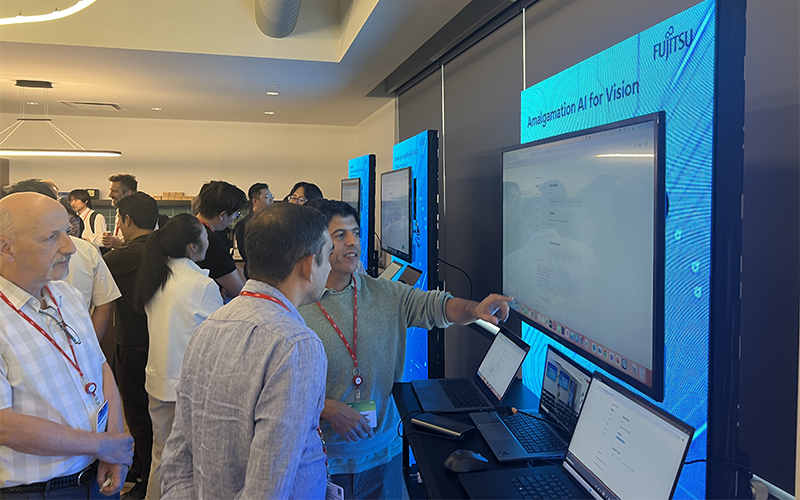
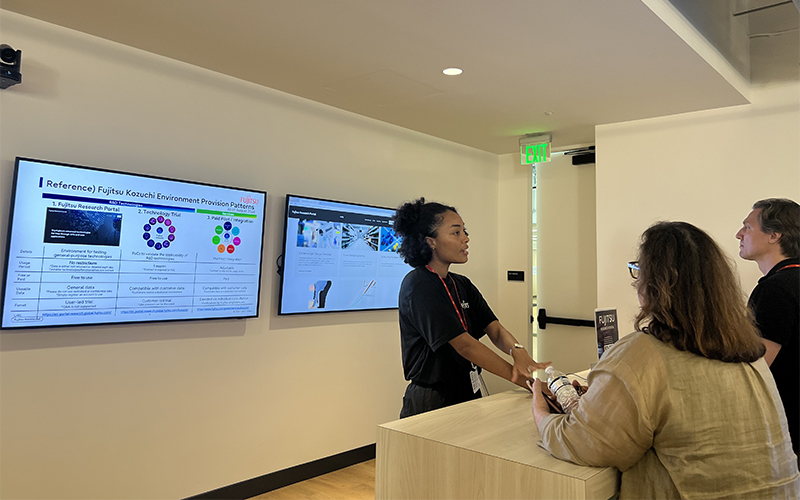
Our Technology Showcase provided a hands-on experience with some of the most exciting innovations from Fujitsu and our partners:
- Amalgamation AI for Vision demonstrated how we are simplifying computer vision tasks through the use of foundation models, making the technology more scalable and cost-effective.
- The Knowledge Graph Extended RAG demo showed how we’re expanding data references to enhance AI-powered insights, allowing businesses to solve more complex problems with greater accuracy and relevance.
- The Fujitsu AutoML integration with MoBagel's Decanter AI demo illustrated how AutoML simplifies AI adoption, making it faster and more cost-effective for businesses looking to implement AI solutions at scale. (Fujitsu and MoBagel revolutionize business processes through accelerated AI prediction : Fujitsu Global)
These demonstrations showcased how AutoML from our Fujitsu Kozuchi platform, and other proprietary technologies are driving real-world applications across industries, enabling advanced data analysis for smarter decision-making. Their demonstrations and the Fujitsu Research Portal, where visitors can explore our technologies firsthand, highlight how collaboration with startups can lead to mutually beneficial outcomes. Finding these win-win scenarios is a key component of our innovation strategy and we look forward to expanding these initiatives.
Summary: Accelerating Open Innovation Together
As we reflect on the Fujitsu Tech Open House 2024, we’re excited about the future of open innovation and the role we will play in shaping it. From our AI and quantum computing advancements to our startup partnerships, we are pushing the boundaries of technology to deliver real-world impact. The event underscored our commitment to collaborative innovation and faster product cycles, making it clear that Fujitsu is a leader not only in technology but also in fostering a global ecosystem of innovation.
We invite all our partners, collaborators, and stakeholders to continue on this journey with us. Together, we can accelerate the path from R&D to real-world applications through open innovation, creating impactful technological solutions for businesses and society. The Fujitsu Tech Open House 2024 was not just an event—it was a demonstration of what’s possible when startups, academia, and industry leaders unite to innovate. We look forward to expanding these partnerships, pushing boundaries, and shaping the future of technology for a better tomorrow.
For more information on Fujitsu’s global research and collaboration initiatives, visit our Fujitsu Research Portal, which serves as a platform for partnering with others, focused on centralizing our Fujitsu technology.



